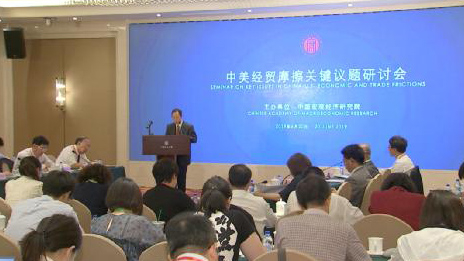

The Seminar on Key Issues in China-U.S. Economic and Trade Frictions was held in Beijing on Thursday, featuring top-notch analysts in the fields of economics and foreign relations. They discussed possible solutions for the ongoing trade war between Beijing and Washington and the implications rising tensions could have on the world economy.
Some economists say China should seek more opportunities to achieve scientific and technological independence given the ongoing trade tensions. Others believe China should focus more on industrial chains.
Vice President of the Chinese Academy of Macroeconomics Research Bi Jiyao noted that the trade surplus, which U.S. Donald Trump has used as a pretext to wage his trade war against China, was never something Beijing had pursued.
"The long-term restrictions on the exports of high-tech products to China by the U.S. have restricted China's expansion of imports. China does not actually pursue a trade surplus, and we actively expand imports," Bi said.
"The U.S. limits the exports of these products on the grounds of so-called national security," he explained.
But the current trade crisis could have a silver lining, according to economist Chen Dongqi, who said that with tariffs slapped on Chinese imports to the U.S., looking for new markets for its exports could bring China a rare opportunity to realize independence in science and technology.
Attendees and speakers all agreed that a resolution to the current situation is in everyone’s interest.
Ye Fuqing, head of the Foreign Economics Institute noted that, "The trade frictions initiated by the U.S. have brought a very negative impact on and severely disturbed the order of the international economy and trade. They destroyed the global industrial chain, and threaten many national economies."
Huang Hanquan, head of the Institute of Industrial and Technological Economics echoed Ye’s concerns.
"The world's high-tech industry is now highly integrated. The trade frictions have spread to areas like science and technology. The impact of the supply chain will impact national companies and other enterprises involved in this...not just companies in China and the U.S., but also those in Japan, South Korea, Europe, and elsewhere."
Chinese President Xi Jinping and his U.S counterpart are expected to meet on the sidelines of the G20 Summit in Japan later this month, and all eyes will be on the two leaders for signs of respite in the tense ties between the world’s two biggest economies. High-level trade negotiations have stalled in recent weeks, and Washington is threatening to impose 35-percent tariffs on essentially all remaining Chinese goods entering the U.S. – valued at roughly 300 billion U.S. dollars.

Copyright © 2018 CGTN. Beijing ICP prepared NO.16065310-3
Copyright © 2018 CGTN. Beijing ICP prepared NO.16065310-3